Many men have reached out to me during the past two weeks because they are curious as to why I decided to begin a series of stories on the history of Wheeling’s organized crime, and all of them did so in an anonymous fashion. They want to know what I know. They want to know if I know of them. Some want to meet the next time they visit the Friendly City, and others have already requested my phone number. And yes, they have called using blocked digits.
These wise guys once worked within the Paul Hankish organization, and because they didn’t attract the attention of the feds, they escaped to what they thought were anonymous places in Utah, Montana, North Dakota, Michigan, Alabama, and Missouri. Their time was up in the Upper Ohio Valley, and they knew it because of what they did notknow. The future direction the federal investigation would take after Paul Hankish was convicted of extortion, drug-trafficking, gambling, and tax evasion was a complete mystery, especially since many of those involved with the Mob’s operation were not indicted.
According to two former Hankish-employed bookies, it was on this floor in a building near 14th and Main streets, where all collected revenue was counted and recorded during the 1970s and early 1980s.
The “left-alone” guys knew, though, that they could be charged at some point simply because they stayed on the local radar and continued to do what they knew best, and that’s one of the reasons why the brand of organized crime known in Wheeling for five decades vanished once “No Legs” went to federal prison in 1990.
Bill Lias ran the rackets in Wheeling and in most of the Upper Ohio Valley for more than three decades, and Hankish gained control in the late 1960s, but the most impactful difference between the two eras was the presence of the Federal Bureau of Investigation. Lias most definitely attracted the attention of the federal government during his legitimate career as a businessman, most often for failing to pay the amount of taxes he owed. He was suspected often in murder and assault cases, but the suspicions never turned into solid evidence. Soon, however, after Hankish lost his legs in a car bombing/assassination attempt on Richland Avenue in Warwood in January 1964, J. Edgar Hoover’s FBI started staring hard at Wheeling, W.Va.
“The shit got real when the feds came into town, but they weren’t really able to get on the inside until they were here for a bunch of years,” one former bookie told me. “The first group of guys the feds arrested just took it. They went to trial or pleaded out for the best sentence possible, and they went to prison and didn’t sell anyone out.
“When those guys got out, they came back and went back to work. But while the guys were in prison, their wives were visited each week and given cash. They called it unemployment back then,” he continued. “If you followed the rules, your family was taken care of, but once the feds got involved, guys started rolling over on some of the bosses so they could stay out of jail altogether.”
A few of the Wheeling Mob’s made men were unofficially exonerated by federal investigators with one condition – the squealers had to leave the Friendly City forever. And they did, too, to some of the blandest and blankest boroughs they could find west of Ohio.
Gambling, drug-trafficking, and prostitution all took place in the shadows of a nationally known Wheeling company.
“If they weren’t here in their eyes and their cameras and whatever, then maybe they would be forgotten, especially after the feds charged Hankish with all the indictments. As long as they got out of town and out of state and went west, they didn’t have to worry about getting pulled over for speeding or something like that,” the bookie explained. “There were guys like me who could stay because we didn’t do much of the really bad shit, but some did, and they had to go wherever they had to go.”
This one wise guy, though, would not say where that is. His identity has been protected via email and while conversing on the telephone with me, but he readily refers to himself a “rat.”
I’ll refer to him as “Splinter” from this point on.
“I often wonder what would have happened in Wheeling had I not been a rat,” he said. “I know it changed, but I’m not sure for the better.
“I set the wheels in motion as a confidential informant working for (Tom) Burgoyne and, of course, one of my favorite Wheeling cops, James Wright. I actually just walked into the FBI office and said, ‘Who wants to get some bad guys?’”
Burgoyne, an agent with the FBI for more than three decades, confirmed this rat’s tale. He remembers the first meeting very well.
“The man you are talking to is 100 percent accurate. He’s 100 percent. One day he just decided to walk into the federal building and came to my office,” Burgoyne said. “He said that he had a problem with cocaine, but he had control of it and didn’t like what he was seeing once he got sober. I guess he wanted to do the right thing.
“I don’t know if he was a wannabe cop or what, but he did provide information on a lot of low-level guys in the 1980s, and that let us start climbing the ladder because the more we had on guys, the more they started telling us what we wanted to know,” he said. “I know there was one guy who went to prison because of what he told us about a lot of activity in Wheeling, and there were some connections to other cities like Columbus and Cleveland.”
Susie’s Bar is a great South Wheeling Tavern today, but it was known as the “Wooden Nickel” during the days the Hankish organization ran the gambling action that took place inside.
Burgoyne said Splinter’s criminal activity was centered in Centre and South Wheeling and that his duties extended into Benwood too. If Splinter had any involvement in prostitution, the federal government did not know about it and the informant never claimed to be active in that area of the Mob’s business.
“The gambling and prostitution were really separated back then,” Burgoyne recalled. “The drugs were present in both areas of operation, but the betting and the girls never appeared to us to be intertwined.
“Back in those days, the guys involved with the gambling could be seen sitting in the first pew at church, but not the guys who were running the brothels. You didn’t see those guys in church, ever,” he said. “Those guys and gals were probably too busy sleeping off the night before.”
Splinter was not on the FBI radar before he introduced himself, the veteran federal agent confirmed, but meeting him and listening to him educated these G-men. Splinter ran errands, collected poker machine and spot-sheet revenues, arranged drug pick-ups and local distribution, and, in many cases, was more hands on than the kingpin.
“He was a street guy, and we weren’t concentrating on people who were playing his role, but once we realized what he did, we knew we should have been all along,” Burgoyne explained. “We knew what was going on but didn’t know how to connect the dots in some cases. When he came forward, it started making more sense.
“There were a lot of guys like [Splinter], and it seemed to be that a lot of them created their own problems because of the drug use,” he continued. “At that time I didn’t know if [Splinter] was involved with the drug activity to just feed his own habit, but I can tell you that most of them were doing that.”
The former Wally’s Bar along Jacob Street in South Wheeling burned down more than two decades ago, but current residents recall that the establishment featured at least two illegal, 25-cent poker machines.
Splinter was a cocaine addict. He admits it. He would collect drug drops, transport the shipments to locations in all areas of Wheeling, and snort line after line of cocaine all along the way. Most often he was under Hankish’s rule, but not always, and that’s because coke sales skyrocketed in the area as soon as it was introduced.
“I don’t think the people of today realize there was a drug culture in the Valley in the 1970s and 1980s, and I was dealing cocaine for a lot more people than just Hankish,” he admitted. “And there were also the spot sheets, booking, and the poker machines. Not a lot of people really cared about what I was doing or what a lot of others were doing as far as the Mob was concerned, and it wasn’t because anyone was afraid. It was just accepted, and a lot of people were buying what we were selling.
“Essentially, I started the dominoes to fall; the guys I fingered rolled or informed, and the rest is history,” Splinter said. “I didn’t tell the feds everything because I did not want to implicate some of my friends. In the end, though, Hankish was gone for good. I felt so bad for his son.
“I can say with certainty that my efforts with Burgoyne did not lead to catching any ‘Big Fish’ directly, but due to the timing and those involved, I have always assumed that it did in an indirect way, ergo, by way of the domino effect,” he continued. “I didn’t tell Tom everything. Just what he was asking me about. The feds didn’t know everything, and that’s how I was also able to help my friends that I didn’t want to see get in trouble.”
Splinter said he was suspected by a few of his co-workers and even questioned by a couple of them. He claims he acted his way out of those confrontations but suspected not every one of his associates bought his performances. When that one man was suffering from terminal cancer years later, Splinter felt he needed to visit with him one last time. It was then when he bared his soul.
“And he knew it was me just like I thought he knew the whole time, and that’s when I found out that he was one of those guys who had to leave the Wheeling area to stay out of jail,” he said. “I didn’t know that before then, and it was because of something I said during one of the interviews with Burgoyne.
“I worked pretty close to him back in those days, and I cared about him, I guess. He didn’t really share much with me about what he was up to, but the whiskey usually helped with that. I’ll admit it; I was always a nib-nose even before I started with the feds, and I think that was because I really did want to know what I was getting myself into.”
Many back-door deals, said “Splinter,” took place on the corner of 45th and Jacob streets in the South Wheeling section.
Splinter also made a deal with Burgoyne that in exchange for his squeal-appeal he would not have to testify against Hankish during the federal trial in 1990, but he still ran from Wheeling in hopes of fading from memory in the non-digital world.
But with him Splinter took his demons.
“Turning them in didn’t cure the problems in my life. I’ve thought a lot about what brings a guy to get addicted to coke and think he wanted to be in the Mob. I guess you lie to yourself when you’re in that position,” he said. “What I was doing back in those days was very destructive, but it was so damn fun. It really, really was.
“But even after I ran from Wheeling, I kept doing the coke. I was addicted, and I stayed addicted for a long time after. I finally got clean and sober, but it was a hell of a fight because I wasn’t really sure I wanted to quit. But I did, and here I am today.”
Burgoyne and his fellow agents noticed the absence of many of the men who were once involved with the rackets, but he admitted that several other confidential informants involved with that federal trial have remained in the area.
“It was the crazy ’80s,” he said. “It was so obvious that people didn’t have to be directly involved with any of it to see it happen. If you worked at one of the bars or one of the restaurants where these guys went, you saw it, and you knew what it was.
“When I first came to Wheeling in 1967, I quickly found out that people were betting on the high school football games we had here in the Valley,” Burgoyne added. “People were betting on anything and everything, so there was a lot of action. And then the drugs came in.”
According to police records, Paul Hankish earned his “No Legs” nickname when his Studabaker exploded at 10 a.m. on Jan. 17, 1964, along this stretch of Richland Avenue in Warwood.
By the time crack cocaine was introduced to the Upper Ohio Valley in the late 1980s, Hankish was facing more than 100 federal indictments, his dealers disbanded, and a Jamaican connection swarmed over the free market in the Friendly City. Splinter had already fled the area, but he kept an eye on his hometown from afar. He remains protective, aloof even, with what he offers me because he’s still not sure of what retribution he could encounter if he divulges too much. He’s careful with names, vague about some connections because he’s still protecting some friends, and Splinter says his health is waning now from years of cocaine abuse.
But he, too, is curious.
“I just hope in the end I don’t end up dead someday because of what I did in Wheeling because I’m a pretty nice guy these days,” Splinter said. “I’m not trying to bring anyone down by talking to you.
“I just know a lot of the truth,” Splinter said. “I’ve been thinking of writing a book about all of it, but I don’t know. There would be a lot of names.”
Several betting boards similar to this one have been discovered in locations throughout the Friendly City. This one is located in a building for sale on Market Street.

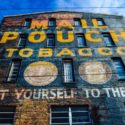
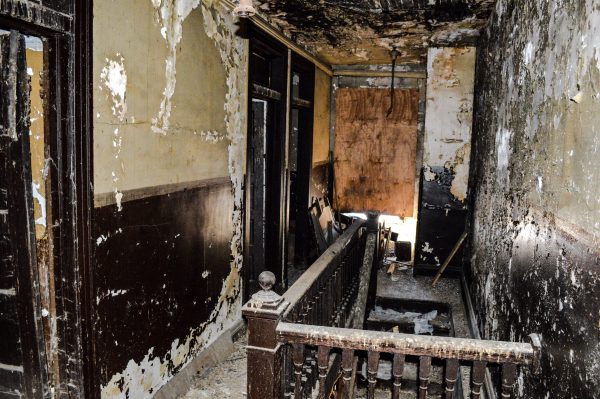
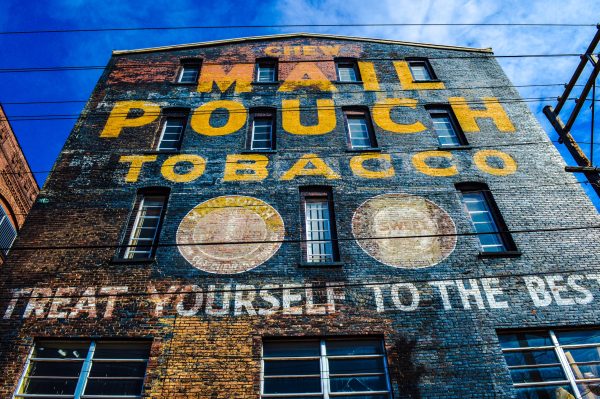

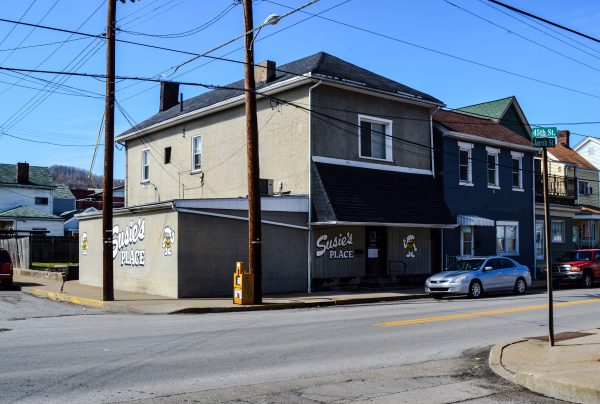
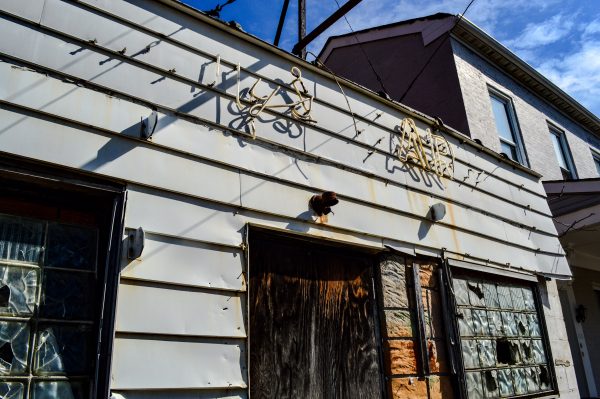
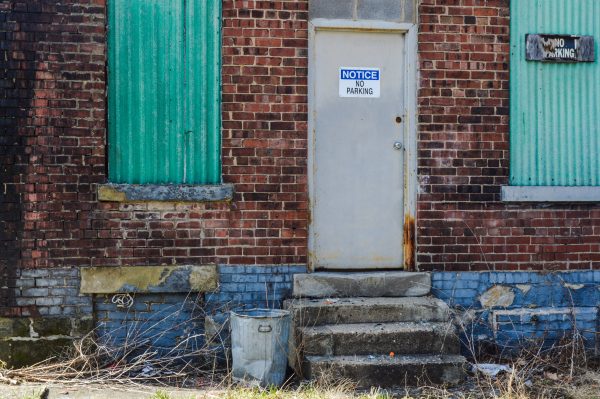
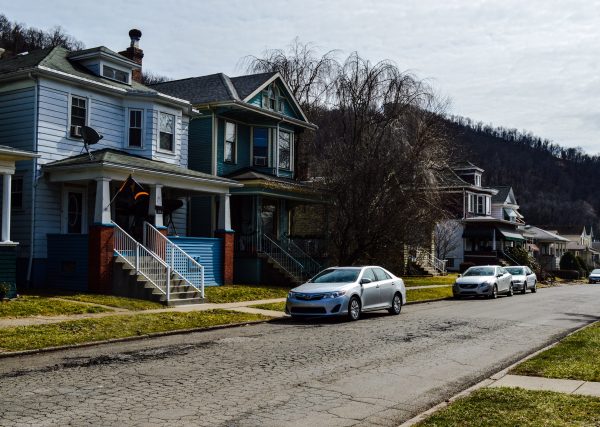
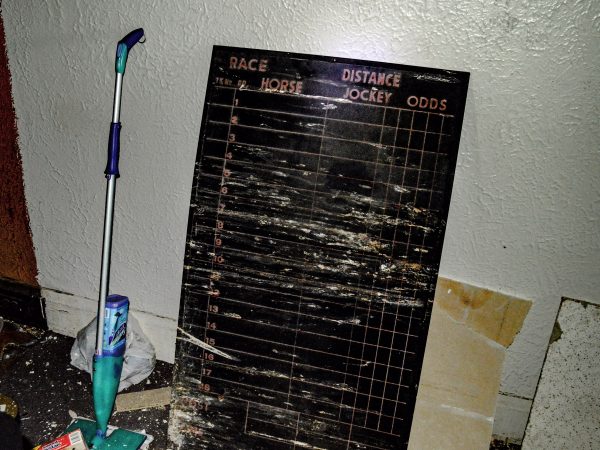
Leave a Reply
You must be logged in to post a comment.